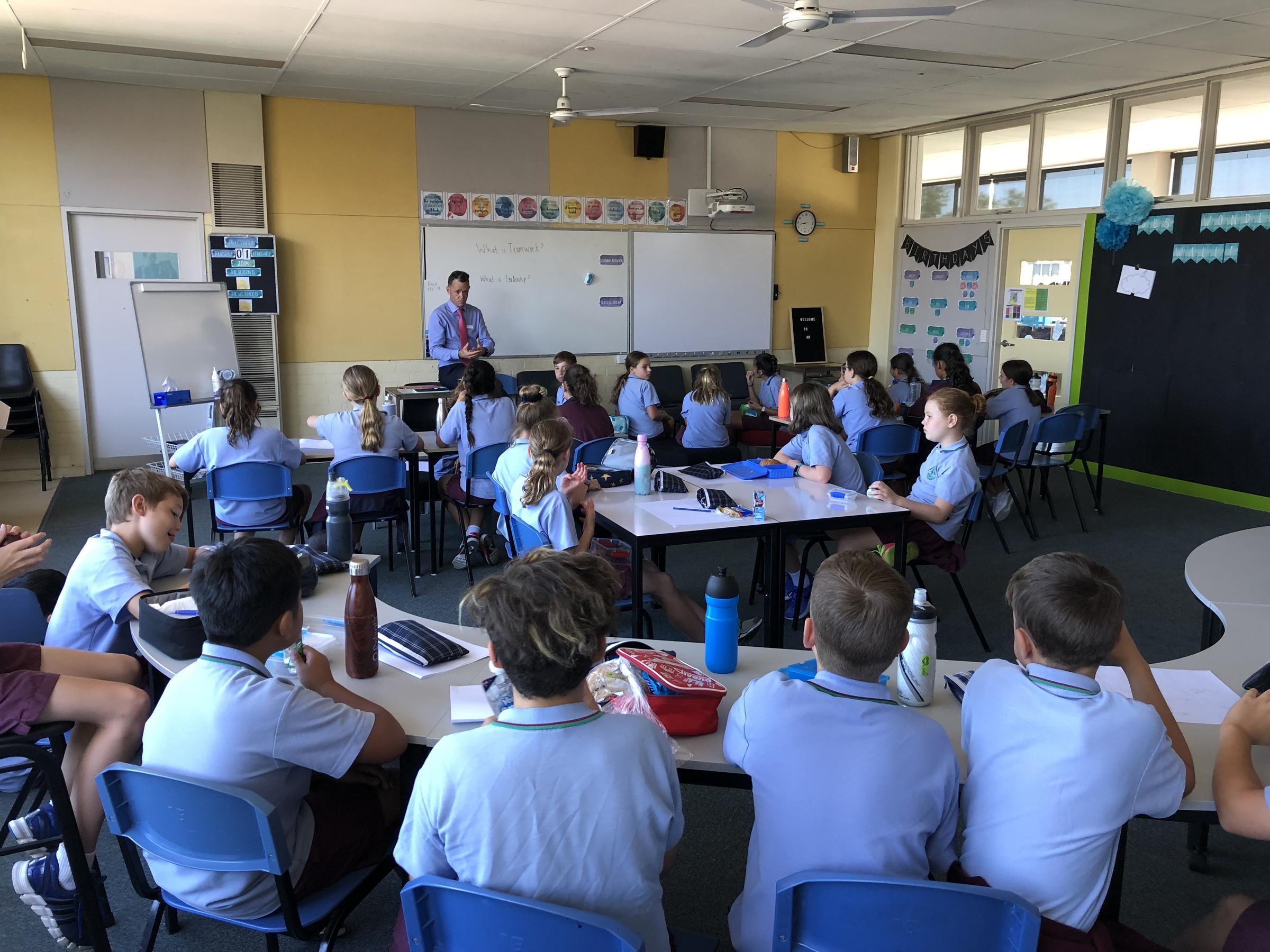Learning and Teaching

Helping Your Child With Maths
We all do maths every day, sometimes without even knowing it!
People use maths every day in real situations. Whether you are at home, in the garden, playing sport, in a restaurant, shopping, driving or on holidays - maths is always needed.
Maths is not just about numbers. It is also about shapes, sizes, patterns, directions, positions and chance.
Maths is not something that just happens at school. In fact, the real maths happens outside the classroom. Maths is taught at school to give your child effective maths skills to use for life - and you can help! Your child will develop important skills by being involved in maths at home.
Encourage your child to talk about maths by asking open questions like these:
- Which one is the best buy? How do you know?
- What shape would fit best?
- Is it likely to happen? Why/why not?
- How many will we need?
- Did your team win? By how much?
- Do we have enough? Why?
- Will we have time?
- How long will it take?
- Which way should we arrange the furniture?
Everyday Maths
In the home
- Read the water meter. Work out how much water was used for the families showers in the evening. You might even save some water!
- Use digital and analogue scales to measure quantities for cooking. How many grams in a kilogram? what does 1/2 a liter mean?
- Ask your child to record important dates and times on the family calendar.
In the car
- Check the odometer in the car. Work out how far you have travelled.
- How many liters of petrol do we need?
- How long will it take us to get to our destination? What time do you think it will be when we arrive?
Shopping
- Get your child to work out the best deals - one item at $2.99 or three for $8.00? Then ask your child to work out the change you would get from $50.00?
- Use shopping catalogues or online sites to plan the weekly shop.
In the newspaper
- Talk about weather patterns, Is it likely to rain today? How much is expected?
- What is the temperature in London? How much warmer will it be here?
- Talk about sports scores. Did your team win or lose and by how much?
Number Intervention
Jane Ferris
jferris@gsmelbournesth.catholic.edu.au
Welcome back to a new year of Number Intervention at Galilee! For those of you new to the school or to the programme, I’m providing in this newsletter a brief overview of our journey in Number Intervention last year, as well as a link to my full report of the programme across the school in 2017. The report can also be found on the school website under Numeracy section. The report discusses the reasons for the introduction of the programme at Galilee and the ways in which the programme was implemented. It contains comments contributed by teachers, Learning Support Officers, parents and students about the success of the programme throughout the school. I hope you enjoy reading it!
Number Intervention at Galilee
As we approached our 2017 Review last year, the new leadership team, with the staff at Galilee Regional Catholic Primary School, investigated the school’s data and discovered a pressing need in the school for some kind of Maths intervention. Our 2016 NAPLAN data and school-based assessment revealed Numeracy as an area of school development. As shown in the table below, our scores for Numeracy, despite being higher than state and national scores, was still our lowest performing area of the curriculum.
Specialist intervention:
As the Number Intervention specialist, I used the F-4 Learning Framework in Number to profile students’ number knowledge and target children’s specific learning needs. Being in training this year, I had specific guidelines to follow, involving two teaching cycles within the year, each lasting 12 to 15 weeks. In the first semester, eight students from Years Three and Four were taught, and during the second semester, six students from Years One and Two. Students were taught individually, in pairs or in trios. My role was to:
- identify at-risk students through research-based assessment schedules that indicate the student’s level of number development;
- apply necessary intervention strategies in a detailed sequential instructional system to improve student performance in various aspects of number knowledge;
- and build student confidence, helping students attain success in Mathematics.
As a result of this intensive intervention, each child demonstrated impressive growth in understanding in various aspects of Number within the semester. The growth was reflected in classroom learning and throughout other areas of Mathematics. The increased confidence of each child in the programme led to success in the classroom in other areas of learning. Specifically, the average growth in the fourteen children who participated in the intensive specialist intervention programme was a minimum of nineteen months across five domains of the programme: Numeral Identification, Forward and Backward Number Word Sequences, Structuring Numbers (1-20) and Conceptual Place Value. After approximately forty 30-minute sessions of targeted intervention, 93 percent of the students progressed from below standard to confidently achieving at standard in Number. (The 7% who did not achieve standard have since been identified with specific learning difficulties.)
Classroom teachers reported improved outcomes as a result of the specialist intervention; one stated:
“…As a classroom teacher, I see first-hand, how these Number Intervention sessions benefit the students. Working closely with Jane, the students in the Number Intervention programme have gone from strength to strength, moving from below standard to confidently at standard in a short period of time….”
(Carmen – Classroom Teacher)
The remainder of the report can be found on the school website through the following link:
http://www.gsmelbournesth.catholic.edu.au/uploaded_files/media/number_intervention_at_galilee.pdf
Please contact me via email (above) if you would like to take part in parent training in Number Intervention in 2018. I will notify interested parents soon of our starting date. For an introduction to helping in the classroom, please attend our Classroom Helper Sessions on the following dates: March 2 or March 9, 9.30-10.30am. Thank you very much to parents who have already contacted me. I appreciate the support and look forward to another great year of Number Intervention!



